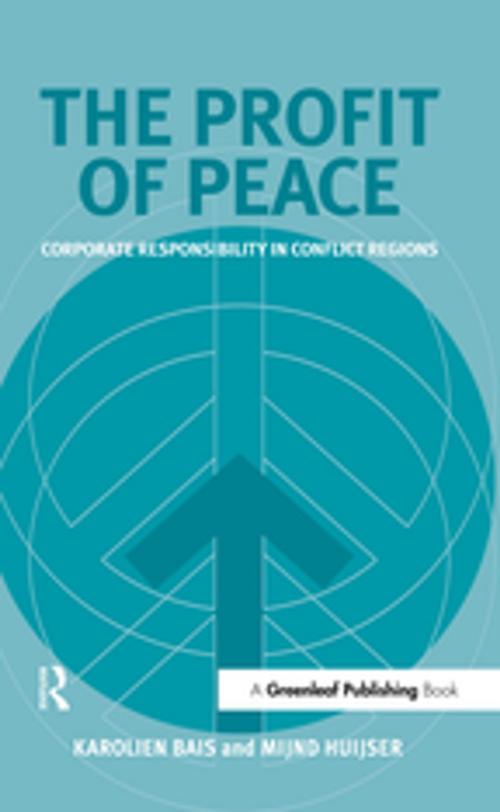The Profit of Peace
Corporate Responsibility in Conflict Regions
Business & Finance, Business Reference, Business Ethics, Management & Leadership, Management| Author: | Mijnd Huijser, Karolien Bais | ISBN: | 9781351280662 |
| Publisher: | Taylor and Francis | Publication: | October 19, 2017 |
| Imprint: | Routledge | Language: | English |
| Author: | Mijnd Huijser, Karolien Bais |
| ISBN: | 9781351280662 |
| Publisher: | Taylor and Francis |
| Publication: | October 19, 2017 |
| Imprint: | Routledge |
| Language: | English |
It may seem a strange notion to give the private sector a role in conflict prevention or resolution, but multinational corporations (MNCs) do have some characteristics that make them good partners in a well-designed strategy for peace and stability. By focusing on their core competencies, their presence in a conflict region can help to provide prosperity for rebuilding society and its institutions, and improved respect for human rights. This book is not a song of praise for MNCs in general. There is a litany of examples of companies that feel no shame in profiting from conflicts by trading weapons or illegal resources, that prolong war by supporting one or other of the parties, or that are only in a war-torn country because the lawlessness suits them well. Even companies that refrain from such criminal activities cannot be envisaged as potential peace-builders if they profit unscrupulously from cheap labour or cheap subcontractors. Instead, this book is about corporations that are disposed to ethical, responsible entrepreneurship: companies that balance their desire for profit with compliance with international business and human rights standards and with a genuine investment in local workers, environmental protection, social development and stability.
Worldwide about 60,000 MNCs work in over 70 conflict regions. They operate in regions where social unrest is harshly repressed, where outright fighting takes place, or where civil war has recently ended. Whatever the attitude of multinationals and whatever their area of business, they influence conflicts or are themselves influenced by conflicts. Even if they do not directly invest in or trade with a conflict region, they always risk being associated with those conflicts. The Profit of Peace examines how multinationals can use their core business competencies to promote peace and stability in conflict regions and what role – if any – business has in diplomacy. To investigate these questions the authors interviewed CEOs and high-level managers of multinationals working in 'challenging' countries such as Afghanistan, Burma and Rwanda. The interviewees provided extraordinarily candid views on both the practical and ethical issues that occur when operating under extremely volatile circumstances. The lessons learned by these managers make the book invaluable for any manager working for a large company in a region of unrest. Two vital elements emerged. Firstly, the ability to manage cultural differences is a key factor for success. Without a keen sense of the differences in management styles, in perceptions of ethics and morality, and in the values behind political opinions, every peace effort is doomed to fail. Secondly, ethically correct decisions do not necessarily lead to ethically correct results. It was not the objective of the authors to judge which of the parties in conflict regions are right or wrong. Rather, they wanted to find out what kind of attitude at the end of the day contributes most effectively to conflict prevention or stabilisation of a region. In other words, in this book corporate responsibility is measured by the results and not by the intentions. All of the CEOs interviewed for this book were well aware of the fact that their companies operating in conflict regions would always influence the conflict one way or another. This awareness in itself is quite extraordinary, and it shows that the indifferent comment "business is business" by and large belongs to a past era. Also extraordinary was that the managers allowed such a frank look into their sanctuary, since this candour makes them all the more vulnerable to criticism. Through the information from the interviewees and from other managers who have experience in conflict regions, the book outlines the ingredients for an approach that can best lead to a solution of conflicts and to greater stability. It will only be in the long run that we will be able to establish how successful the new profession of 'business diplomat' can be, but in the meantime the daily practices of MNCs show that they can work on 'the profit of peace'. This book is based on investigative journalism and contains many examples of best practices worldwide. It will be essential reading for practitioners, policy-makers and students involved with corporate social responsibility, peace studies, development studies and stakeholder management.
It may seem a strange notion to give the private sector a role in conflict prevention or resolution, but multinational corporations (MNCs) do have some characteristics that make them good partners in a well-designed strategy for peace and stability. By focusing on their core competencies, their presence in a conflict region can help to provide prosperity for rebuilding society and its institutions, and improved respect for human rights. This book is not a song of praise for MNCs in general. There is a litany of examples of companies that feel no shame in profiting from conflicts by trading weapons or illegal resources, that prolong war by supporting one or other of the parties, or that are only in a war-torn country because the lawlessness suits them well. Even companies that refrain from such criminal activities cannot be envisaged as potential peace-builders if they profit unscrupulously from cheap labour or cheap subcontractors. Instead, this book is about corporations that are disposed to ethical, responsible entrepreneurship: companies that balance their desire for profit with compliance with international business and human rights standards and with a genuine investment in local workers, environmental protection, social development and stability.
Worldwide about 60,000 MNCs work in over 70 conflict regions. They operate in regions where social unrest is harshly repressed, where outright fighting takes place, or where civil war has recently ended. Whatever the attitude of multinationals and whatever their area of business, they influence conflicts or are themselves influenced by conflicts. Even if they do not directly invest in or trade with a conflict region, they always risk being associated with those conflicts. The Profit of Peace examines how multinationals can use their core business competencies to promote peace and stability in conflict regions and what role – if any – business has in diplomacy. To investigate these questions the authors interviewed CEOs and high-level managers of multinationals working in 'challenging' countries such as Afghanistan, Burma and Rwanda. The interviewees provided extraordinarily candid views on both the practical and ethical issues that occur when operating under extremely volatile circumstances. The lessons learned by these managers make the book invaluable for any manager working for a large company in a region of unrest. Two vital elements emerged. Firstly, the ability to manage cultural differences is a key factor for success. Without a keen sense of the differences in management styles, in perceptions of ethics and morality, and in the values behind political opinions, every peace effort is doomed to fail. Secondly, ethically correct decisions do not necessarily lead to ethically correct results. It was not the objective of the authors to judge which of the parties in conflict regions are right or wrong. Rather, they wanted to find out what kind of attitude at the end of the day contributes most effectively to conflict prevention or stabilisation of a region. In other words, in this book corporate responsibility is measured by the results and not by the intentions. All of the CEOs interviewed for this book were well aware of the fact that their companies operating in conflict regions would always influence the conflict one way or another. This awareness in itself is quite extraordinary, and it shows that the indifferent comment "business is business" by and large belongs to a past era. Also extraordinary was that the managers allowed such a frank look into their sanctuary, since this candour makes them all the more vulnerable to criticism. Through the information from the interviewees and from other managers who have experience in conflict regions, the book outlines the ingredients for an approach that can best lead to a solution of conflicts and to greater stability. It will only be in the long run that we will be able to establish how successful the new profession of 'business diplomat' can be, but in the meantime the daily practices of MNCs show that they can work on 'the profit of peace'. This book is based on investigative journalism and contains many examples of best practices worldwide. It will be essential reading for practitioners, policy-makers and students involved with corporate social responsibility, peace studies, development studies and stakeholder management.















